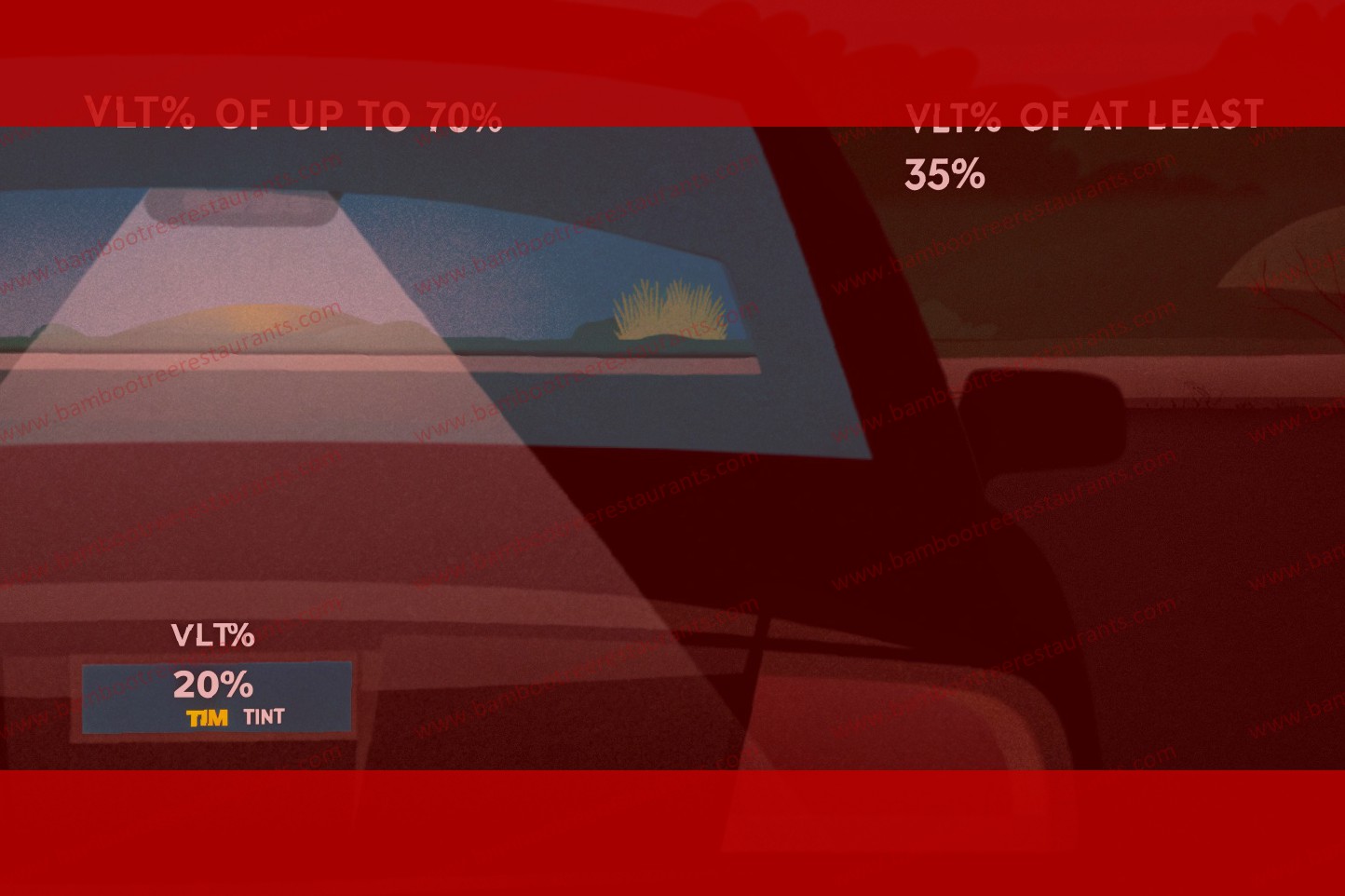TN Legal Window Tint Laws
Tennessee has specific laws regarding the tinting of vehicle windows. Within the state, there are two categories to consider when examining TN legal tint. The first is the visible light transmission percentage (VLT%), which is the amount of light that can pass through a window. The second is the total solar heat gain coefficient (TSHC), which measures a window’s ability to reduce solar heat.
There are also restrictions on reflectivity, where the window must reflect more light than the window glass alone and be more reflective than a standard window. The common types of window film are metalized, dyed, and ceramic. Each has different levels of reflectivity and different average costs.
According to TN law, the VLT% for front windshields is up to (but not below) 70%. For any other windows, the VLT% should be at least 35%. The windshield’s AS-1 line can be tinted down to 5%, or within the manufacturer’s visible tint band. The rear window VLT% restrictions when it’s tinted is at least 20%.
The front side window TSHC is 43 % or less. The other side window TSHC is 35% or less . The rear window TSHC is 25% or less. This indicates that when the tint is applied, it should block all but 35% of the sun’s rays.
The manufacturers’ certificate of compliance label must be adhered to the tint. This helps law enforcement identify whether a window does or does not comply with TN law. A violation of TN law regarding window tint results in a $100 ticket. Those who have a ticket for illegal window tint cannot have the ticket dismissed or appeal the ticket, which makes having the window tint reviewed by an official when obtaining a driver’s license or registration important.
Any TN window film that is darker than 20% VLT is considered illegal and is punishable by a $100 fine. Window film may not be allowed on the front windshield window itself. The only exception is the manufacturer’s certificate. The certificate must be signed, readable, and placed vertically in the lower corner of the windshield on the driver’s side. This is the same for the side windows; however, the certification can be faded or tinted. Also, reflective windows are illegal on all windows except the windshield.
Why Are There TN Window Tint Laws?
Tennessee imposes strict laws regarding window tinting and it is not alone in doing so. Lighting experts and lawmakers acknowledge the benefits of having their laws in place in order to keep the general public safe. One important reason why tint laws are strictly enforced is due to the visibility of drivers using tinted windows. The darker the tint, the more difficult it is for a police officer to determine who exactly is behind the wheel of the vehicle. This is especially critical when a traffic stop has to be made or an accident occurs. If a driver has to quickly be identified for any reason, tinted windows pose the danger of hindering this process, thus has the potential of putting both officers and the general public at risk.
In Tennessee, law enforcement officials have reported that darker tinted windows are a major contributor to both the deaths of motorists and police officers. Visibility is a crucial concern among all who share the road in order to maintain safety. If too much tint is allowed on windows, the ability to see pedestrians or police officers is compromised. Police Official Brian Frazier of the Oldham County Police Department in Kentucky stated that "darker tint increases the potential for confrontation." In other words, if police officers were also unable to see what is inside a car because of its tinted windows, they would approach the situation more cautiously.
Visibility factors sometimes come into play even when officials are able to see inside a tinted window. When officers are unable to see who is within the car, they sometimes have no choice but to assume that it might be a person with a gun. This may seem as though drivers who follow the tint laws could avoid such a situation, however, this is not always the case. Law enforcement officials are sometimes placed in a position of apprehension when conducting a routine traffic stop. As a result, many police officers have felt safer when conducting a traffic stop if they have the ability to see the vehicle’s occupants.
Therefore, the issue of tint laws is not so black and white. Lawmakers are intent on making the roads as safe as possible. They do their job with the understanding that officers are relying on their visibility in order to keep them, and the general public, safe when approaching a vehicle. This is the underlying reason why tint laws are enforced so stringently.
TN Tint Penalties
The penalties for tint law violations in Tennessee can range from warnings to hefty fines and, in some cases even criminal charges depending on the severity of the situation. Police officers issues warnings for a first time offense of tinted windows, even though a citation is also issued. While second and third offenders usually receive misdemeanor citations for tinted windows they always have the option to remove them and fight the citations. After police citations for tinted windows, judges will sometimes allow offenders to have their window tint tested by a court-appointed third party. If the window tint passes the test, then the offender receives court supervision and must pay a nominal fine in most cases. Convictions in Tennessee usually result in a $50 fine but for excessive tint, there is an increasing fine for repeat convictions. The first conviction results in a $50 fine, followed by a $100 fine for the second conviction. A third conviction is worth a $200 fine and the fourth conviction nets a $350 fine. That combined with the original fine and court fees amount to nearly $900 for four tint-related offenses. In addition, offenders may be ordered to pay court fees, and they may have to pay a portion of their attorneys’ fees as well, which in conjunction with the fines, can amount to almost $1,000. Multiple convictions in Tennessee are sometimes tried as misdemeanors and offenders can end up spending up to six months in jail for a misdemeanor conviction. Convictions in general can seriously affect your ability to drive legally, and therefore you may be denied certain renewals for your vehicle registration, your auto insurance, or both.
Checking for TN Window Tint
Vehicle owners can measure the tint of their window to ensure compliance with Tennessee tint laws. Several ways are available, including visiting a shop that specializes in window tint.
Even if a vehicle owner thinks the tint looks dark, the only way to know whether it’s compliant for a specific area is to measure it.
Most shops that install window tint are equipped to measure, and some even have testing kits . A shop may be willing to test the tint even if the owner has not had the installation done there.
The owner can also check with a law enforcement agency. They might have a tool, or have personnel who can measure the window tint.
Testing kits are available for purchase online, but only those with an NAAM (National Window Film Association) certification seal are able to produce certificates of compliance. Film samples submitted to a lab must be submitted on an NAAM-certified kit.
TN Window Tint Exceptions & Special Cases
There are a few exceptions to the tint laws in Tennessee. Certain types of vehicles, such as limousines, vans, and buses, have different requirements for window tint. The law states that all other vehicles weighing over 10,000 pounds are treated as vans, even if they do not have windows that can be tinted.
Medical exemptions allow for the use of darker or reflective tints for drivers and passengers who may suffer from chronic sensitivity to moisture or sunlight, certain kinds of dermatitis, porphyria, which is a rare skin disease, albinism, or lupus erythramatosus, which is a disease characterized by a red rash over the face. These are the only medical conditions that excuse the holder of these cards from complying with the window tint law.
The medical exemption does not include conditions caused by sun, such as skin cancers or some other type of skin cancer. However, other conditions that do qualify for an exemption from tint laws are active malignancy affecting the skin, scarring from previous skin cancer, scars causing photodermatitis, systemic carcinomas or other skin disease, external malignancy requiring rigorous therapy with drugs or ultraviolet light, and those taking medications that cause photosensitivity.
For doctors, optometrists, and ophthalmologists in Tennessee, the exemption form must be filled out and provided to the driver, but the professionals who write these notes will need to provide them to you for you to present to law enforcement.
Choosing a lawful tint in TN
The choice of window tint does not have to be an all-or-nothing proposition when it comes to selecting a product that meets your legal needs. Depending on the extent of the tint that you wish to install on your vehicle, you can make a selection that complies with Tennessee law and also meets your aesthetic preferences. While all tint serves to shade the interior of the car from the sun, the darkness of the tint can also impact how much of the outside world you can see through your windows. In general, darker window tint provides superior light blockage while lighter tints allow for greater visibility.
If you need window tint that is compliant with the state’s law, you really only have two options: light tint or extra-light tint. If you wish to avoid the hassle of having to hide your window tint by placing window stickers or other legal documentation in the corner of the tinted window, you may prefer to install window tint that is allowed under the law .
Others may wish for additional light blockage to keep their car as cold as possible while traveling during the warm months. While you may choose to install a darker tint on the rear windows of your vehicle, you must be sure to adhere to the law on the windshield and the front windows so that you do not have any issues with law enforcement.
Ultimately, how dark your tint will be is contingent upon how strictly you wish to follow the letter of the law. It will also depend on whether your local law enforcement is likely to strictly enforce restrictions in the area where you live.
You may choose to contact a professional window tint installer to discuss your needs and preferences in detail. When you know how dark you want your tint to be, you can make a choice that meets the law as well as your needs.



+ There are no comments
Add yours